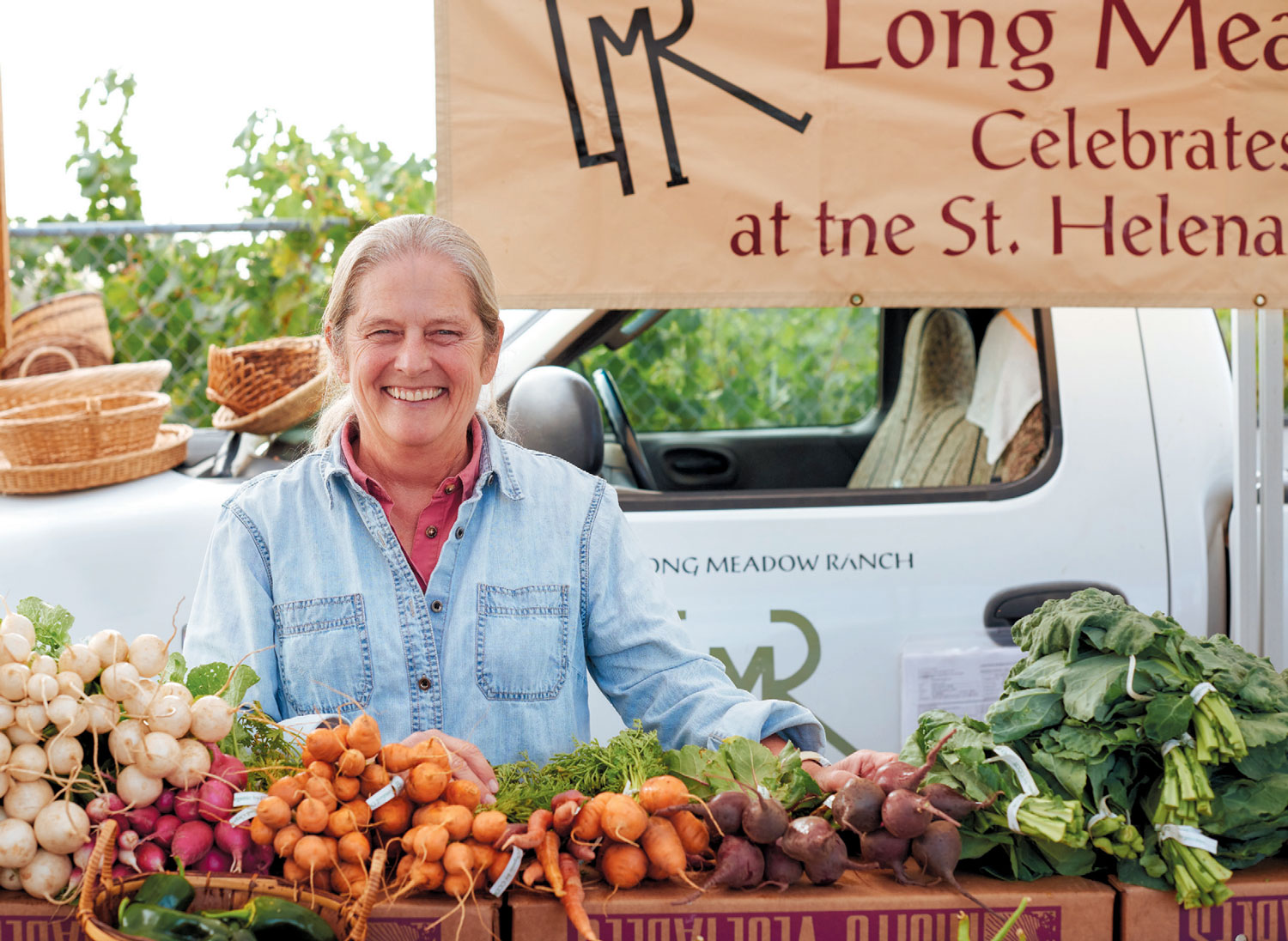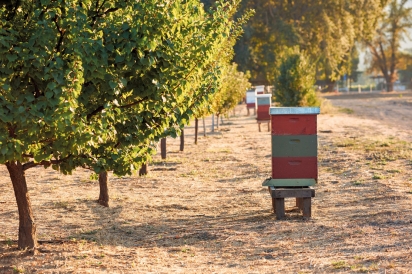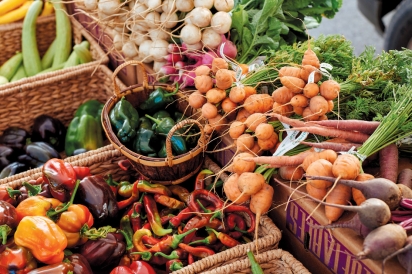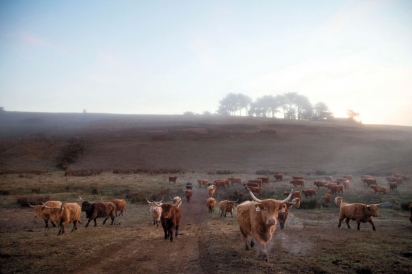Long Meadow Ranch's Laddie Hall
PRESERVING BIODIVERSITY IN WINE COUNTRY
At their Rutherford home, dinnertime is a point of pride for Laddie and Ted Hall.
“When we sit down, everything on the plate is what we have grown, and the wine in our glass is what we have made,” Laddie says. “It’s so satisfying, and I am so grateful.”
Others in the Napa Valley may make wine or press olive oil or grow vegetables, but perhaps no one else does it all—and more—on the scale that the Halls do. They are owners of Long Meadow Ranch winery and farm, which comprises three vineyard estates, as well as the popular Farmstead restaurant in St. Helena that also includes a general store and a café. On more than 2,000 acres, they raise everything from grapes to olives to heirloom fruits and vegetables to 300 chickens to 330 grass-fed, long-haired Scottish Highland cattle. Everything is certified organic. Moreover, the Halls employ about 200 people, the majority of them full-time, including the grape pickers, some of whom have worked for them for two decades.
More is on the way, too. A second winery, outfitted with solar panels and a rainwater reuse system, is expected to open next year on a portion of the farm property beside Highway 29, where the Halls’ Sauvignon Blanc grapes are also planted. Additionally, in the next couple of years they expect to open a 70- to 80-room hotel within walking distance to Farmstead.
“My husband says we have a five-ring circus,” Laddie, 67, says with a laugh, as she strolls through her greenhouses full of microgreens on a blustery spring afternoon.
There were those who definitely thought she was loopy at the start, she concedes. Although the Rutherford property now encompasses 90 acres with vineyards, she was adamant from the beginning against planting grapes on its original six acres that were purchased in 2003. With choice vineyard land worth more than $400,000 an acre in the Napa Valley nowadays, she has stuck to her guns to plant only tomatoes, cucumbers, kale, chard, green beans and squashes on the remainder—about 200 different items total. Laddie believes strongly that the valley’s agriculture should be biodiverse, not merely a wine-grape monoculture.
“They are iconic for providing that example to our valley,” says Laura Regusci of Regusci Winery, who taught agriculture classes for two decades at St. Helena High School and Santa Rosa Junior College, and created a one-acre culinary garden in front of her own Napa winery. “I admire that they had such a great vision and paved the way for others.” Respecting the land has been ingrained in the Halls since Laddie grew up in the suburbs outside of Houston, where her mother had a vegetable garden; and Ted was raised in western Pennsylvania, where he had a pony and chickens, and delivered fresh eggs on his paper route. The two met at a high school dance, then married before moving to the Bay Area so Ted could attend Stanford Business School. Even while living on campus, the Halls maintained a vegetable plot in the community garden there. Ted and his Stanford friends would make their own wine, too, picking leftover grapes in vineyards and saving old wine bottles and peeling off the labels to pour the homemade vino into.
“We made some really good wine,” Laddie recalls. “And we made some really awful wine.”
Still they were hooked, and knew someday they would make wine on a larger scale. The family was living in San Francisco—with Ted a senior partner at McKinsey & Co., and Laddie an Exploratorium docent and an after-school science teacher—when that day came in 1989. A realtor showed them the Mayacamas estate, a little more than 100 acres high up in the hills that did indeed possess a long meadow. It was owned by a family who kept putting it on the market, only to take it off again and again, because they couldn’t bear to part with it. Finally they did, and the Halls snapped it up, even though they could barely afford it.
While still living in San Francisco, the Halls spent every weekend and summer on the Napa land. They planted Cabernet grapes. They discovered hundreds of neglected olive trees and nurtured them back to life.
Their young sons, Timothy and Chris, also started a vegetable garden there. “We would spend Christmases there,” Laddie says. “The kids would be lying on the floor on their bellies in front of the fireplace, looking through seed catalogs like they were toy catalogs.”
The boys had always dreamed of having their own lemonade stand. But Laddie one-upped that by getting approval for them to sell their produce and eggs at the nascent St. Helena Farmers’ Market. When Chris was 11 and Timothy was 8, she started driving them to the market, where they initially sold items by the bag or bunch or piece because they couldn’t afford a scale.
At home, the boys made her keep a running tab on the refrigerator every time she plucked one carrot or two radishes from their garden. Finally, she threw up her hands and offered to buy all their seeds and supplies in exchange for getting her pick from the garden for free.
When the Mayacamas and Rutherford gardens began producing far more than they could use or sell at the market, the Halls decided to open a restaurant. Farmstead debuted in 2010 in an old barn that once was home to a nursery. The farm now supplies more than 100,000 pounds of produce annually to the bustling restaurant that turns out as many as 700 meals a day.
It’s a restaurant that is the epitome of farm-to-table dining. “The chefs will do a walk through the garden and change the dishes as they come through,” says Joseph Hardin, director of agriculture for Long Meadow Ranch.
It also boasts an unheard-of corkage fee of $5. Established when the doors opened, the “Corkage For Community” program earmarks all proceeds from that fee to a different community nonprofit each month. Since its inception, it’s raised more than $165,000.
At 69, Ted remains president of all operations, while Laddie oversees Long Meadow Ranch’s operations at the St. Helena, Napa and Farmstead farmers’ markets. After graduating from the University of Colorado, son Chris returned to Long Meadow Ranch to further develop its diversification. (Son Timothy died tragically at age 13 from a brain aneurysm. In his honor, the family started the Timothy Hall Foundation to support arts and science programs in schools.) Slowing down is not in the Halls’ plans. “Oh no, there is no sitting still, and no cobwebs gathering,” Laddie says. “My husband used to promise me no more projects. I don’t believe him anymore. But we like to imagine we have created something that is successful and a model for others.”









